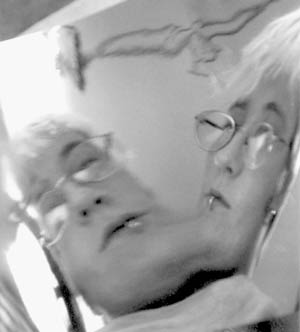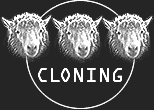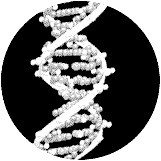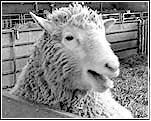
Covering Issues The Way The Media Should
Current Issue
Archives
Music Reviews
About IMPACT
Advertise in IMPACT
E-Mail Us
Join the Mailing List
Subscribe
Buy IMPACT T-Shirts
Links
Back Issue Information
Staff
Wanna Write for IMPACT?
Where to Find IMPACT
Home


-- Mary Shelley, Frankenstein, Or the Modern Prometheus

Earlier this year, following the announcement that scientists in Scotland had cloned a sheep, President Clinton urged a five-year ban on cloning humans, stating that cloning is "morally unacceptable to our society." The legislation, he says, will "reaffirm our most cherished beliefs about the miracle of human life and the God-given individuality each human possesses."
Virtually every scientific breakthrough in human history has been the topic of at least some debate over its ethical ramifications; usually this debate relies in part upon Biblical maxim to determine the "moral" implications. Even anesthesia was once considered to violate the laws of God—people were expected to endure their pain as a "natural" part of their earthly life, and Dr. Christian Bernard's first successful heart transplant sparked a lively debate about the ethics of putting a part of one person into the body of another.
 In the last few decades, advances in reproductive technology have perhaps been hardest hit by controversy. Artificial insemination, "test-tube" fertilization, and surrogate motherhood have all fallen under attack because they seemed "unnatural" -- they eliminated from the process of human conception the act of physical intimacy between parents. Human cloning, the creation of a person from the DNA of another, is the latest of these experiments to provoke a series of hot debates. The issue is very volatile; Karen Rothenberg, a specialist in the ethics of reproductive technology, asked the President's panel of advisors, "Will the first scientist who clones (a human) win the Nobel Prize or be put in jail?"
In the last few decades, advances in reproductive technology have perhaps been hardest hit by controversy. Artificial insemination, "test-tube" fertilization, and surrogate motherhood have all fallen under attack because they seemed "unnatural" -- they eliminated from the process of human conception the act of physical intimacy between parents. Human cloning, the creation of a person from the DNA of another, is the latest of these experiments to provoke a series of hot debates. The issue is very volatile; Karen Rothenberg, a specialist in the ethics of reproductive technology, asked the President's panel of advisors, "Will the first scientist who clones (a human) win the Nobel Prize or be put in jail?"
In the science-fiction version of cloning, an adult is often cloned into an exact, adult replica of himself. For example, in Woody Allen's mid-1970's movie, Sleeper, a cruel dictator has been assassinated by a bomber. Only his nose escaped the bombing intact; his bureaucracy has kept his death a secret -- and kept the nose alive -- intending to clone him before the now-leaderless public learns the truth.
Of course, this is pure fantasy. Human nose-cells -- and every other cell except the reproductive ones, for that matter -- contain the entire genetic code with which one could replicate the entire human. However, a clone would not duplicate the adult, but produce a genetically-identical infant.
To clone a human, a scientist would remove its DNA -- the complex coils of amino acids at the nucleus of one of its cells -- and insert it into a human egg cell. These strands of DNA, if uncoiled, would be about four feet long. They contain the genes and chromosomes -- the series of "codes" that tell the cell what to grow into, how to reproduce, etc., and ultimately how to create a human being and with what traits.
Animals have been cloned for decades. Experiments as far back as the early 1960's produced cloned frogs, and cattle embryos have been cloned for over ten years. What makes Dolly, the cloned sheep, important is that she was cloned from an adult. This, the cloning of an animal from an adult, is significant because scientists had begun to believe that it couldn't be done. Previous animal cloning experiments have been conducted using DNA taken from embryos. When a fertilized cell first divides, it divides into two identical cells. At some point in the embryo's development, however, its cells begin to differentiate, to turn into liver cells, finger-bone cells, etc. At that point, all the genes except those that read "liver cell," for example, "switch off," and make up the animal's liver, as do all the non-eyeball genes in the cells that become eyeballs, the non-finger genes the finger cells, and so on. The problem, then, in cloning from a fully-differentiated organism, is this: How do you switch the genes back on, so you don't just clone a liver? This is a gross oversimplification, but you get the point.
The scientists who cloned Dolly managed to catch each cell, the cell from the adult sheep's mammary glands and the egg into which they implanted the DNA, at the same exact stage of cell division. Somehow, this switched all the genes back on, resulting in a lamb, whom the scientists named after Dolly Parton, in honor, one supposes, of the source of her DNA.
 The fears have arisen since Dolly's cloning range from French Farm Minister Phillipe Vasseur's speculation that cloning will eventually lead to the making of six-legged chickens, to those voiced by Jack Scarisbrick, chairman of Britain’s Anti-Abortion Charity: "Cloning of certain types of individuals for their own purposes to provide, for example, a spare set of organs, or to do the donkey work ... by governments (of clones) who will perform certain duties .. kamikaze pilots or drones of society ... by dictators of replicas of themselves to maintain their regimes ... the commercialization of human life, so that you can get off-the-shelf types to suit you --a six-foot blonde this time, next time a pianist ..."
The fears have arisen since Dolly's cloning range from French Farm Minister Phillipe Vasseur's speculation that cloning will eventually lead to the making of six-legged chickens, to those voiced by Jack Scarisbrick, chairman of Britain’s Anti-Abortion Charity: "Cloning of certain types of individuals for their own purposes to provide, for example, a spare set of organs, or to do the donkey work ... by governments (of clones) who will perform certain duties .. kamikaze pilots or drones of society ... by dictators of replicas of themselves to maintain their regimes ... the commercialization of human life, so that you can get off-the-shelf types to suit you --a six-foot blonde this time, next time a pianist ..."
On the other hand, many proponents of cloning have suggested that it could have many beneficial uses, such as allowing infertile couples to have children that were genetically related to them. Speaking to the Bioethics Advisory Committee, a panel of experts appointed to advise Clinton on the issue, Moshe Tendler of Yeshiva University in New York proposed that only the most reprehensible uses of cloning should be banned, and that it could have moral and therapeutic uses --for example, preserving a family line where there was only one survivor, as in cases following the Nazi holocaust.
One of the main arguments against cloning is its perceived threat to the natural course of human evolution -- and to the sanctity of "individuality." As Clinton said in his call for a ban on cloning, "Creating a child through this new method calls into question our most fundamental beliefs ... at its worst, it could lead to misguided and malevolent attempts to select certain traits, even to create certain kinds of children -- to make our children objects, rather than cherished individuals."
One question ethicists and biologists will have to battle over is the nature of "individuality." What makes a human an "individual"? Are clones, because they are genetically similar to someone else, somehow robbed of their existential rights?
Social scientists have long argued the influence of "nature versus nurture," whether the role of genetic pre-programming or of environmental influences has the greater impact on the creation of the individual human personality. In truth, both play roles: genes determine certain tendencies, while environment provides the necessity for using those tendencies to develop characteristics. For example, the tendency towards introversion can be measured almost from infancy, before environmental factors have had much chance to influence personality.
However, this genetic tendency doesn't doom one to a life of social introversion. Many environmental factors come into play. If, because of career demands, for example, the person feels a strong need to overcome his innate shyness, he can do so. For the genetically predetermined introvert, it will be harder to be the life of the party than it will for the natural-born extrovert -- but not impossible.
Also, personality is subjective. Personality varies depending on who observes the individual. For illustration: a psychologist once suggested I take a personality test, the abbreviated version of the Myers-Briggs. I have a strong tendency towards introversion, which has been the case for as long I can remember; as a small child, I required some goading before I would play with other kids, and I preferred solitary activities like drawing or listening to music over group activities like team sports. To put it in a nutshell, I'm "typed" as a typical introvert, I can play solitaire for hours, but poker bores the crap out of me in a matter of minutes.
The psychologist suggested I have several people "take" the test on my behalf; in other words, answer its questions about me. I was surprised at the outcome. My mother only rated me the same as I did 3 out of 4 times. My brother rated my personality almost exactly opposite of my own rating of it. My point is that variation between individuals is due not only to a combination of genetic and environmental circumstances, but to the circumstances the individual is in from moment to moment.
 A clone, then, while he or she might be an exact genetic match, will never be a true replica of its parent. The clone is genetically identical -- an identical "twin" of its parent. Even identical twins raised together, while their personalities are likely to be shaped by very similar environments, will differentiate by adulthood.
A clone, then, while he or she might be an exact genetic match, will never be a true replica of its parent. The clone is genetically identical -- an identical "twin" of its parent. Even identical twins raised together, while their personalities are likely to be shaped by very similar environments, will differentiate by adulthood.
I know a pair of adult identical twins. They were raised together, went to the same schools, and even majored in the same subjects at the same college. They went to work doing identical jobs at the same company. However, one twin advanced to an upper-level management position, while the other stopped climbing the ladder several rungs down from his brother. They shared many preferences; they both liked golf and fishing, for instance. However, one became an avid fisherman, while the other played a lot more golf. One stayed married to the same woman for over 20 years, while the other one married and divorced three times in the same period.
Their children would not have considered them interchangeable, nor would their spouses. By middle age, they didn't even look alike; there was a "strong family resemblance," of course, but the effects of diet and activity had molded them into non-identical people.
Another of the big arguments against cloning is its potential for irresponsible commercial exploitation. One very real potential commercial product that could come from cloning is DNA licensing. Suppose, for instance, that it became fashionable among the rich to bear clones of famous personalities -- sports figures or actors, for instance. Such people might license their DNA -- give a chunk of flesh to some cloning clinic, and allow themselves to be sold off, chromosome by chromosome, for the purposes of cloning and implanting their genetic replicas. Are there people in the world who'd like to raise their very own Shaquille O'Neal or Michelle Pfeiffer?
What if Shaq were to decide, ten years down the road, that the clones were his children, and wanted them? Who could dispute his rights as the parent? The children, genetically speaking, would be his -- 100%. Would the contracted transfer of DNA rights hold up in court against the higher ethical issues? Remember, we live in a society in which truly horrible parents have been granted parental rights, after having once relinquished them, on the basis of their genetic claim.
On the flipside, suppose Shaq is diagnosed in middle age with a previously unrecognized disease of genetic origin. Would the "parents" of his clones have a product-liability claim against his defective DNA?
There are much more frightening commercial prospects. Two of the most powerful industries driving technological innovation are defense and sex. The Internet, for example, was developed by the defense industry. However, much of its expansion for personal use and money generated directly by the 'Net relate to sexual uses: pay-per-view porn, adult videoconferencing, and the like. Cloning, like the Internet, may be commercially viable largely because it can be exploited for defense -- by "manufacturing" cannon-fodder, for instance, and for sex.
There are countries where you can get away with almost anything -- where humans are already bought and sold as commodities. In parts of Indochina, parents sell their children into prostitution and women can be purchased and "snuffed." Once cloning humans can be done safely and reliably, what would keep the porn industry from selling off chunks of starlets to unscrupulous cloning practitioners in the Third World -- farming new generations of Amber Lynns and Linda Lovelaces so that high-rollers from America can pay top dollar for a few hours with a genetic replica of a famous porn queen?
German scientists, haunted by the memories of Nazi attempts to create a superman, have been among the most outspoken against cloning. Ever since the publication of The Origin of Species in the 19th Century, social Darwinists have proposed engineering a better human through natural selection. They preached that the elite of society had reached their status because they were more highly evolved than the lower classes. Much of the fear surrounding cloning comes from the idea that "natural" selection will be replaced by engineered selection.
Futurists predict that the most earth-shattering advances that humankind will make over the next few decades will emerge from the field of biotechnology. Cloning is just one of those advances, and a rather prosaic one, compared to some of the plans currently being researched. The ethical and legislative decisions we make about cloning will have ramifications that will shape the future of humanity.
As Dr. Ronald Munson, ethics specialist at the University of Missouri, said, "I think the reason we take it so seriously is that it makes it very clear for the first time that we are now in charge of a large segment of the biological world -- that we have, in effect, become the business managers of evolution."
Some scientists have said that unlocking the key to cloning will represent the greatest human achievement since the discovery of fire. To many of its opponents, however, cloning is bad purely because it does not involve the "sacred" union of a man and a woman -- because it leaves God out of the creation process. Their fears about cloning mirror those of Mary Shelley, when her Dr. Frankenstein created life -- and created a being without a soul. They wonder, "If man creates this thing, this clone, does it have a soul?"
Whether we choose to believe in the "soul" or not, whether we prefer to keep the mystery and romance in reproduction, or discard it in the face of cold reason, many pragmatic concerns about the future of reproductive technology exist. The questions we will have to answer in the coming decades will concern our rights over the use of our own bodies and DNA versus our concern that, in our zeal for scientific progress, we do not create monsters far worse than Shelley could envision.
Backed by powerful economic incentives, cloning will undoubtedly occur. Opposing Clinton's ban on cloning, Iowa Sen. Tom Harkin said "What utter nonsense to think we're going to somehow hold up our hand and say 'Stop.' Cloning will continue; the human mind will continue to look into this. Human cloning will take place, and it will take place in my lifetime."
Perhaps not in America, but elsewhere entrepreneurs like Seed will exploit the human technology, and will justify it like Seed did: "God made man in his own image. Therefore, he intended that man become one with God. Man should have an indefinite life and have indefinite knowledge ... cloning is one step."
Back to February/March '98 Issue